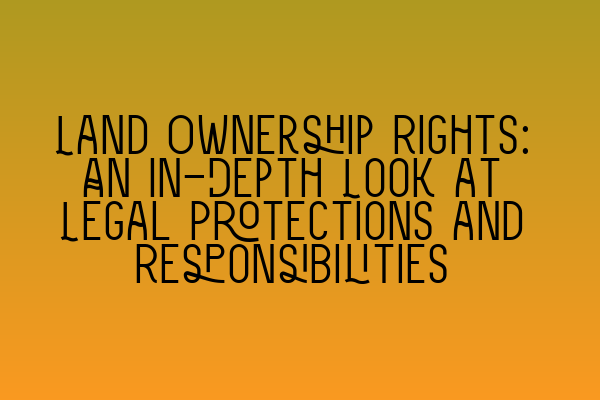Land Ownership Rights: An In-Depth Look at Legal Protections and Responsibilities
When it comes to land ownership, understanding your rights and responsibilities is crucial. Whether you are a homeowner, property investor, or business owner, having a solid grasp of the legal framework surrounding land ownership can help you protect your interests and avoid potential disputes.
1. Different Types of Land Ownership
Land ownership can take various forms, each with its own set of legal implications. The most common types of land ownership include:
- Freehold: This is the absolute ownership of the land and any buildings or structures on it. Freehold owners have the most significant rights, including the right to sell, lease, or make alterations to the property.
- Leasehold: Leasehold ownership grants the right to use and occupy a property for a specified period. The owner of the leasehold property, known as the leaseholder, typically pays ground rent and service charges to the freeholder.
- Commonhold: This is a relatively new form of land ownership in which multiple property owners jointly own the freehold of a building or development. Each owner has a share of the freehold and also contributes to the maintenance costs.
Understanding the type of land ownership is crucial because it determines the rights and responsibilities of the owner. For example, freehold owners have more flexibility in land use, while leasehold owners may have restrictions imposed by the terms of their lease.
2. Legal Protections for Landowners
As a landowner, you have certain legal protections that safeguard your rights and interests. Some of these protections include:
- Right to Quiet Enjoyment: This legal doctrine ensures that landowners and tenants can enjoy their property without interference or disturbances from others.
- Right to Exclude Others: Landowners have the right to control access to their property and can exclude others from entering without permission.
- Right to Use and Develop Land: Freehold owners have the right to use their land as they see fit, within the confines of the law. This includes the right to develop the land, subject to planning permissions and other regulatory requirements.
- Right to Defend Property: Landowners have the right to take legal action to protect their property from trespass, encroachments, or any other unauthorized activities.
These legal protections ensure that landowners can exercise control over their land and enjoy the benefits of ownership. However, it is important to note that these rights may be subject to certain limitations and legal obligations.
3. Legal Responsibilities for Landowners
Alongside the rights, landowners also have legal responsibilities that they must adhere to. Some of the key responsibilities include:
- Maintenance and Repair: Landowners are responsible for keeping their property in a reasonable state of repair and maintenance. This includes repairing any structural defects, maintaining utilities, and ensuring compliance with health and safety regulations.
- Compliance with Planning and Zoning Laws: When it comes to developing or modifying land, landowners must comply with local planning and zoning regulations. This ensures that land use is appropriate and does not infringe on the rights of neighboring properties.
- Payment of Taxes and Charges: Landowners are responsible for paying property taxes, such as council tax and business rates, as well as any service charges or ground rent associated with leasehold ownership.
- Environmental Considerations: Landowners have a responsibility to manage their land and activities in an environmentally responsible manner. This includes adhering to regulations related to pollution control, waste management, and conservation.
By fulfilling these legal responsibilities, landowners maintain the value and integrity of their properties while ensuring compliance with applicable laws and regulations.
4. Implications of Land Ownership on Financing and Investments
Understanding the legal aspects of land ownership is of paramount importance for property investors and those seeking financing for their land-related projects. Lenders and investors evaluate the legal status of the land and the associated rights and responsibilities as part of their due diligence process.
From a financing perspective, having a secure and marketable title to the land is essential. Lenders need assurance that the land can be used as collateral, should the borrower default on their loan obligations. Similarly, investors need to assess the potential risks and returns associated with land ownership before committing capital.
Furthermore, understanding land ownership rights and responsibilities can also help property investors identify opportunities, assess potential legal issues, and make informed investment decisions.
5. Seeking Professional Legal Advice
Given the complexities surrounding land ownership, it is always advisable to seek professional legal advice when dealing with land-related matters. Legal professionals, such as solicitors specialized in property law, can provide expert guidance on rights, responsibilities, and legal remedies available to landowners.
At SQE Property Law & Land Law, our team of experienced solicitors can assist you with all aspects of land ownership, including residential and commercial property transactions, lease agreements, land disputes, and more. We understand the intricacies of property law and can provide tailored advice to protect your interests.
Whether you are purchasing a property, negotiating a lease, or resolving a boundary dispute, our legal expertise can help you navigate the complexities of land ownership to achieve your desired outcomes.
For more information about the SQE exams and preparation, check out these related articles:
- SQE 1 Practice Exam Questions
- SQE 1 Practice Mocks FLK1 FLK2
- SQE 2 Preparation Courses
- SQE 1 Preparation Courses
- SRA SQE Exam Dates
Remember, being well-informed about land ownership rights and responsibilities is the first step towards protecting your interests and making informed decisions in the world of real estate.
